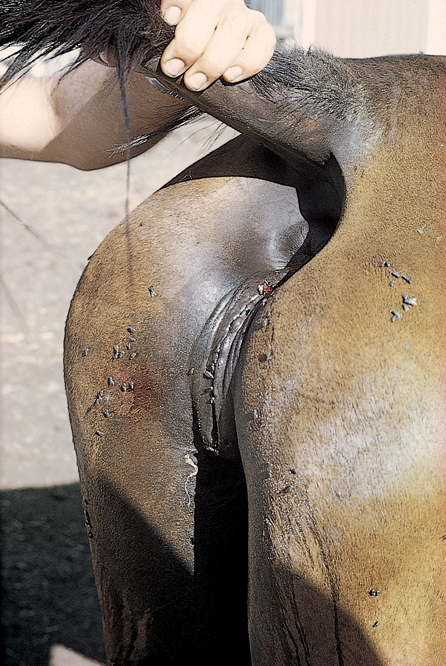Difference between revisions of "Equine Reproduction and Stud Medicine Q&A 06"
| Line 16: | Line 16: | ||
|q1= What clinical conditions may exist? | |q1= What clinical conditions may exist? | ||
|a1=Acute and chronic endometritis, pneumovagina, urine pooling and an incompetent cervix. | |a1=Acute and chronic endometritis, pneumovagina, urine pooling and an incompetent cervix. | ||
| − | |l1= | + | |l1= |
|q2= What physical changes might be detected on clinical examination which indicate a possible cause of the infertility? | |q2= What physical changes might be detected on clinical examination which indicate a possible cause of the infertility? | ||
|a2= | |a2= | ||
| Line 25: | Line 25: | ||
(5) palpation and speculum examination to determine the location of the urethral opening and of | (5) palpation and speculum examination to determine the location of the urethral opening and of | ||
downward displacement of the cervix and anterior vagina anterior to the pelvic brim. | downward displacement of the cervix and anterior vagina anterior to the pelvic brim. | ||
| − | |l2= | + | |l2= |
|q3= Do you regard this mare’s vulva conformation to be a contributing factor to her infertility? | |q3= Do you regard this mare’s vulva conformation to be a contributing factor to her infertility? | ||
|a3= Yes. | |a3= Yes. | ||
| − | |l3= | + | |l3= |
|q4= What importance is attached to the level of the pelvic brim in relation to the vulva? | |q4= What importance is attached to the level of the pelvic brim in relation to the vulva? | ||
|a4=The high level of the pelvic brim in relation to the vulva maintains an almost vertical vulva. A low pelvic brim may cause the vulva to tend to a horizontal position. | |a4=The high level of the pelvic brim in relation to the vulva maintains an almost vertical vulva. A low pelvic brim may cause the vulva to tend to a horizontal position. | ||
| − | |l4= | + | |l4= |
</FlashCard> | </FlashCard> | ||
Revision as of 15:36, 19 June 2011
| This question was provided by Manson Publishing as part of the OVAL Project. See more Equine Reproduction and Stud Medicine questions |
A 12-year-old multiparous barren mare failed to become pregnant the previous breeding season. Examination of the genital tract reveals a mature follicle present, an open cervix and a slightly distended uterus which, on palpation, expresses air out through the vulvar lips. Speculum examination revealed a reddened and relaxed cervix with air bubbles intermixed in a clear thin watery discharge.
| Question | Answer | Article | |
| What clinical conditions may exist? | Acute and chronic endometritis, pneumovagina, urine pooling and an incompetent cervix.
|
[[|Link to Article]] | |
| What physical changes might be detected on clinical examination which indicate a possible cause of the infertility? | (1) Poor conformation of the vulva and anus; (2) the presence of air bubbles in the vaginal and/or uterine mucous indicates the possibility of pneumovagina; (3) careful manual exploration may indicate injury to the cervix; (4) ballooning of the anterior vagina may indicate both pneumovagina or urine pooling; (5) palpation and speculum examination to determine the location of the urethral opening and of downward displacement of the cervix and anterior vagina anterior to the pelvic brim. |
[[|Link to Article]] | |
| Do you regard this mare’s vulva conformation to be a contributing factor to her infertility? | Yes.
|
[[|Link to Article]] | |
| What importance is attached to the level of the pelvic brim in relation to the vulva? | The high level of the pelvic brim in relation to the vulva maintains an almost vertical vulva. A low pelvic brim may cause the vulva to tend to a horizontal position.
|
[[|Link to Article]] | |
